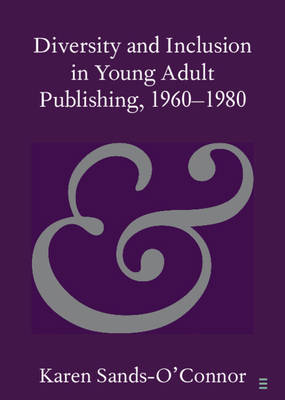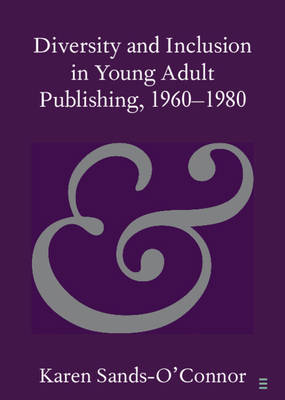
Door een staking bij bpost kan je online bestelling op dit moment iets langer onderweg zijn dan voorzien. Dringend iets nodig? Onze winkels ontvangen jou met open armen!
- Afhalen na 1 uur in een winkel met voorraad
- Gratis thuislevering in België vanaf € 30
- Ruim aanbod met 7 miljoen producten
Door een staking bij bpost kan je online bestelling op dit moment iets langer onderweg zijn dan voorzien. Dringend iets nodig? Onze winkels ontvangen jou met open armen!
- Afhalen na 1 uur in een winkel met voorraad
- Gratis thuislevering in België vanaf € 30
- Ruim aanbod met 7 miljoen producten
Zoeken
Diversity and Inclusion in Young Adult Publishing, 1960-1980
Karen Sands-O'Connor
€ 25,95
+ 51 punten
Omschrijving
This Element examines the early years of British Young Adult (YA) publishing at three strategic publishing houses: Penguin, Heinemann and Macmillan. Specifically, it discusses their YA imprints (Penguin Peacocks, Heinemann New Windmills and Macmillan Topliners), all created at a time when the population of Britain was changing and becoming more diverse. Migration of colonial and former colonial subjects from the Caribbean, India, and Africa contributed to a change in the ethnic makeup of Britain, especially in major urban centres such as London, Birmingham and Manchester. While publishing has typically been seen as slow to respond to societal changes in children's literature, all three of these Young Adult imprints attempted to address and include Black British and British Asian readers and characters in their books; ultimately, however, their focus remained on white readers' concerns.
Specificaties
Betrokkenen
- Auteur(s):
- Uitgeverij:
Inhoud
- Aantal bladzijden:
- 75
- Taal:
- Engels
- Reeks:
Eigenschappen
- Productcode (EAN):
- 9781108827836
- Verschijningsdatum:
- 27/10/2022
- Uitvoering:
- Paperback
- Formaat:
- Trade paperback (VS)
- Afmetingen:
- 127 mm x 178 mm
- Gewicht:
- 95 g

Alleen bij Standaard Boekhandel
+ 51 punten op je klantenkaart van Standaard Boekhandel
Beoordelingen
We publiceren alleen reviews die voldoen aan de voorwaarden voor reviews. Bekijk onze voorwaarden voor reviews.











